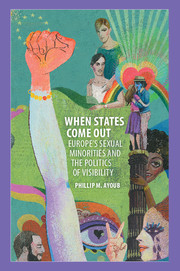Book contents
- Frontmatter
- Dedication
- Contents
- List of figures
- List of tables
- Preface and acknowledgments
- List of abbreviations
- 1 Introduction
- 2 The politics of visibility and LGBT rights in Europe
- 3 Transnational movement: Opportunities, actors, and mechanisms
- 4 Complying with new norms: LGBT rights legislation
- 5 Internalizing new norms: Attitudes toward sexual minorities
- 6 Poland and Slovenia's responses to international norms
- 7 Visibility in movement and transnational politics
- Methodological appendix
- References
- Index
- Books in the Series (continued from p. iii)
5 - Internalizing new norms: Attitudes toward sexual minorities
Published online by Cambridge University Press: 05 May 2016
- Frontmatter
- Dedication
- Contents
- List of figures
- List of tables
- Preface and acknowledgments
- List of abbreviations
- 1 Introduction
- 2 The politics of visibility and LGBT rights in Europe
- 3 Transnational movement: Opportunities, actors, and mechanisms
- 4 Complying with new norms: LGBT rights legislation
- 5 Internalizing new norms: Attitudes toward sexual minorities
- 6 Poland and Slovenia's responses to international norms
- 7 Visibility in movement and transnational politics
- Methodological appendix
- References
- Index
- Books in the Series (continued from p. iii)
Summary
Changing society required a revolution in thought.
– Angelo Pezzana, 2011When the Berlin Wall fell, CEE societies had unprecedented exposure to norms concerning LGBT people, which were developing more rapidly in other parts of the continent. Pathways for the exchange of ideas opened tremendously as the continent again re-examined its understanding of “Europe,” and as increased transnational channels supplemented the internal dynamics that led to such striking changes in CEE. While political scientists generally analyze the diffusion of policies across states, the abruptness and rapidity of European integration in the 1990s also exhibits value internalization among and across societies. Indeed, international norm diffusion theory suggests that accepted ideas spread from areas of high concentration (usually powerful states) to areas of low concentration; at its essence, this theory describes how social entities change their behavior (Florini 1996). Change in attitudes toward sexual minorities is thus a measure of norm internalization that goes beyond state compliance.
Surely, for most LGBT movements, legal recognition is deeply intertwined with the objective of sociocultural recognition. A “revolution in thought,” as the Italian transnational activist Angelo Pezzana called it, is about fundamental shifts in behaviors, practices, and understandings that change lived experiences for sexual minorities. Activists like Pezzana understood that for minorities – who are so often deemed radical in their own domestic contexts – such changes have both domestic and transnational sources.
In this chapter, I focus on international norm diffusion pertaining to changing attitudes and perceptions of sexual minorities in an integrating Europe. Attitudes toward homosexuality are still largely negative in most countries around the world, including much of Europe, and only recently has there been a more rapid shift toward internalizing the norm of accepting homosexuality. In their “return to Europe,” newly admitted member states were exposed to similar EU norms and regulation, yet their societies display stark variations in value shifts (see Figure 5.1). For example, between the dissolution of the Warsaw Pact in 1991 and accession to the EU in 2004, nearly 60 percent of Slovaks positively shifted their opinion on homosexuality, while Hungarians saw no positive change at all.
This chapter returns to several core questions: why have societal attitudes toward lesbian and gay people been different across states?
- Type
- Chapter
- Information
- When States Come OutEurope's Sexual Minorities and the Politics of Visibility, pp. 127 - 157Publisher: Cambridge University PressPrint publication year: 2016



